Is our fixation on healing, self-care & self-improvement making us sicker?
Part I: The more I focus on feeling better, the harder it is to feel better
In 2020, coming out of an abusive relationship, I was wholly swept up by the “working on your healing your trauma” wave and fixated on dissecting my rough childhood… all during peak pandemic shut-down isolation. It was initially satisfying to be sold clear, simple explanations to indescribable amorphous pain— e.g. books & online content on “recovering from narcissistic abuse”. It was validating to be told that I was the hero of my own story & my only task was to heal, break intergenerational patterns, & rise above. It was somewhat empowering to drown in messaging that told me I did not need anyone else, that I CAN do it on my own. When I wasn’t working, I was reading books about trauma, in therapy or with my psychiatrist. Even if I was with friends, I’d often steer the conversation towards topics that would further allow me to intellectualize my problems & brainstorm self-improvement hacks. I was fixated on “working on myself”— which ironically did not work out in the long run.
This 2-part series dives into: 1) the impact of our collective obsession with healing, self-care & self-help culture, and 2) why our health depends on us going such approaches.
TABLE OF CONTENTS
Does self-care & self-help culture make us more lonely?
“Loneliness, my old friend”— Why we self-isolate
We’re not meant to spend this much time in our heads
Fixation on self-care, healing & self-improvement breeds self-absorption
If we look outside of ourselves… we might just feel lighter on the inside
PART II (coming this weekend):
We need to diversify our “mental ecosystem” for our own wellbeing— Featuring the following illustrative examples: 1) OCD, 2) Anxiety disorders, 3) People Pleasing Behavior, 4) Rejection Sensitive Dysphoria
P.S. Let me know what you think in the comments, especially if it makes you think of something, resonates with you or if you have feedback about another direction I should go or ideas for topics you’d like me to potentially write on.
1. Does self-care & self-help culture make us more lonely?
We live in the era of self-love, self-help & self-care. Everyone- celebrities/ politicians/ billionaire CEOs to even radical leftists- has embraced the “healing & mindfulness revolution”. It has never been cooler to go to therapy or work on your trauma. Unsurprisingly, the self-help industry is worth more than $52 billion and the self-care, wellness industry is worth over $5.6 trillion, yes TRILLION (these are underestimates). Even the US military has $125 million dedicated to mindfulness programs that aim to craft mental armors for soldiers to optimize their “combat performance”.
U.S. corporations lose roughly $300 billion to $2 trillion a year from stress-related worker absences and disengagement. Good ol’ capitalism creates stress and THEN pathologizes it because it’s bad for business. Stress reduces our productivity but the burden of managing it is privatized & relegated to the individual which explains the explosive popularity of pop psychology/ psychiatry.
But many people ALSO turn to therapeutic tools to feel better in general because surviving late-stage capitalism/ colonialism is hard.
In fact, self-improvement, self-help & healing rhetoric dominates online & offline spaces across the political spectrum. Some people turn to self-help books, therapy & meditation to emotionally regulate so they can be more productive and achieve their career/ life goals. Others turn to the same therapeutic tools, read books like “The Body Keeps Score” or “The Myth of Normal”, & go to yoga classes led by PoC instructors… to unpack their trauma & heal so they can feel more liberated.
Bottom-line: People desperately want to feel better and thus often fixate on self-improvement in some capacity.
We also live in the era of alienation with unprecedented rates of global isolation. Most of us (estimated 30-90% of the population depending on the study) are chronically lonely. Prevalence of maladies like depression and anxiety is steadily and rapidly rising. The pandemic made it more obvious. Depression and anxiety rates spiked globally when an already severely isolated & fragmented species became even more separated & disconnected.
If loving ourselves, prioritizing, caring for & working on healing ourselves is the answer… and there are a plethora of tools marketed to us (from therapists to embodiment coaches to mindfulness apps), then why are we more distressed & sicker than ever before on a global population level?
Some leftists may point out that mainstream mental health is depoliticized, making us blame ourselves for our pain rather than the systems oppressing us and so we turn to products sold to us as “solutions”. The self-care industry has undoubtedly contributed to the rise in loneliness. So yes, that’s one piece of the puzzle but that doesn’t explain why people across the political spectrum tend to think that focusing on self-improvement & self-love will make things better for us in some way.
If personalized self-care & working on our trauma is the solution, then why so many of us still not fulfilled?
2. Loneliness, my old friend
Hey, I get it. We’re doing what we can to cope. In a lonely world, it makes sense to turn inward for validation. When isolation is the norm, it can feel familiar & comforting. We spend majority of our lives in some form of isolation (at work/ school/ home, in shallow relationships, etc). Our schedules, how we live, where we live (urban architecture), the relationships we’re socialized to prioritize, our so-called ambitions & life goals— they’re all designed to keep us lonely, separated & in competition with each other. Given that the bar is so horrifically low, “At least I know how to be alone” is a logical thought.
Even if real safety lies in our ecosystem & the relationships outside us, we conflate the familiarity of the self with safety. Loneliness is the monster we know so in our most vulnerable moments, we’re more inclined to choose it to cope with uncertainty & instability.
Social media is saturated with messaging from “urban monks” like Jay Shetty who say stuff like “Alone, we learn to love ourselves, understand ourselves, to our own pain, and to care for ourselves” or “Take care of yourself, don’t look to others for your self worth. Know that you’re enough!”. Many of us have felt inadequate our whole lives navigating relentless hardships. Often we feel demoralized, debilitated & confused navigating the unpredictable, flaming s**tshow that is capitalist, colonial society. So it’s logical to find motivational self-care, self-help messaging appealing. It is enthusiastically certain. It tells us that the answer to our pain is already here, simple, many have figured it out & we can do it independently without relying on anyone… if we just work hard enough & prioritize ourselves.
Even now, whenever I’m more vulnerable & particularly distressed, my instinct is to self-isolate to “work on myself”. I have a tendency to obsessively dissect & intellectualize my problems. My mind over-analyzes a problem, hoping that with enough iterations of cyclical thinking, a logical, clear solution will emerge & bring some relief with it.
3. We’re not meant to spend this much time in our heads
Growth is important. Self-awareness is critical to unlearning internalized capitalism/ colonialism which is a life-long journey we must be devoted to. But, much of this work happens in community, through the process of living itself.
If we’re constantly, excessively fixated on reading about trauma & unpacking it in isolation (even thru a more politicized framework), we’re spending far too much time in our heads.
Take the new-age (co-opted, sterilized, distorted) mindfulness movement for example- it’s main message is that we are distressed because we worry too much or overthink leading to us not being present in the moment. While that’s partly true, it doesn’t get to the root of why we are a generation of overthinkers. Why DO we worry so much?
According to new-age spirituality, the solution to overthinking & stress is to practice mindfulness, close our eyes, watch our breath, retreat inward, focus on the self, cultivate “nonjudgmental self-awareness”, unbridled by external influence, undistracted by outside noise. Self-care & self-love messaging peddles the same form of focus on THE SELF, as does more “radical” messaging on trauma healing or neurodivergence. Ultimately, mainstream healing tools & frameworks encourage us to center ourselves… I.e. they breed self-centeredness.
Any obsessive pursuit of self-improvement or self-healing takes a paradoxical toll on us. The more we focus on feeling better, the more self-absorbed we are and the harder it is to feel better. The more we focus on fixing ourselves in private, the harder it is to find ease.
Mainstream approaches to mindfulness, meditation, breath work, somatics/ embodiment, etc focus on making the self feel like home when home is a web of relationships we’re meant to anchor into. Home is connection, community, culture & an intentional relationship with the land. Modern “gurus” tell us to meditate to anchor into ourselves which is not too different from the self-centeredness capitalism/ colonialism socialize us with.
Chasing home within oneself is a recipe for disappointment. We are destined to feel endlessly inadequate if we’re seeking wholeness within oneself. The pursuit of self-reliance is the pursuit of pain.
4. Fixation on self-care, healing & self-improvement breeds self-absorption
Research conducted over a decade at UChicago showed that loneliness increases self-centeredness and, to a less extent, self-centeredness also increases loneliness. There have been a plethora of studies that show that loneliness harms overall health and wellbeing. Ironically, the state has labeled loneliness an epidemic. Loneliness is the default infrastructure capitalism has designed for our daily lives. Further stress-induced social isolation worsens our egocentrism.
Most people tend to “work on themselves” in isolation or get so overly fixated on it that it drives their social interactions. When we prioritize working on our issues in ways that require us to be alone, overly fixate on analyzing & dissecting our problems (in private or otherwise), constantly examine or surveil our inner states & thought patterns— we become increasingly self-absorbed in a society that is already designed to breed narcissism & cut-throat individualism. We’re not pushing against the dominant forces driving isolation, we’re leaning further into them & getting more engulfed by them. The study referenced before calls stress-induced self-absorption “Chronic Self-Focus”.
Humans have evolved to be complex multicellular species largely due to collectivism and mutual aid. Community and intentional, reciprocal relationships (human to human, human to ecosystem) allow for a constant communication & exchange of ideas. Our minds & bodies adapt through these social & ecological connections making the individual & collective more resilient. The absence of this connection literally hinders our physical, emotional, mental & ecological development which is reflected in the form of illness. Excessive focus on our inner selves makes us less resilient.
5. If we look outside of ourselves… we might just feel lighter on the inside
Without collectivist infrastructure, our minds are already our default sanctuaries and in the absence of connection, they become prisons. We all have an inner voice or multiple voices which we use to dialogue with ourselves throughout the day as we think, process, problem solve, deliberate or… spiral into anxiety. As a result of capitalism’s intentionally isolating infrastructure, we’re forced to spend far too much time conserving internally with ourselves, encased within the confines of our mind. We’re often left to dialogue with our inner voice(s) for prolonged, uninterrupted periods of time without any external interception or intervention where we are free to potentially spiral into blackholes of repetitive, unhelpful thoughts that distort our perception of the world & ourselves. We’re forced to spend a disproportionate amount of our lives in isolation which means the norm is for us to be overly limited to our own small perspective of the world.
Self-centeredness may be a byproduct of us seeking relief to our pain, an act of self-preservation in an isolating society, and a coping mechanism worsened by the digital era. It may feel comforting & affirming in the short-term but it is slowly killing us in the long run. Self-absorption & chronic self-focus ultimately makes us more fragile.
Wait, wtf, are you saying we shouldn’t work on ourselves?
No.
We should reflect on our actions, examine our patterns, change harmful behavior & proactively pursue growth. But the focus of that journey shouldn’t begin & end with the self. Our desire to feel better shouldn’t be focused on self-gratification or self-improvement in the absence of community. Self-indulgence is not the goal & neither is obsessively analyzing our problems. When we’re overly self-involved, we’re most likely MISSING the very sources of relief that we need which lie outside of us, in community, in our ecosystem. Self-obsession & chronic self-focus can be debilitating & demotivating, making it more difficult for us to take action even if it is in our self-interest. Our survival cannot & was never meant to be internally motivated, so why would healing be?
We’re not meant to heal by being buried in books, therapy, podcasts, & endlessly consuming self-affirming, validating online content on trauma. If we’re endlessly fixated on self-improving in private, we’re not living.
Our survival is not dependent on us overcoming or healing our trauma completely per se. The entire framework is flawed given that we live in a fundamentally traumatic empire. Our survival is bound together & dependent on us struggling together. Liberation is about collective struggle not isolated self-improvement. Yes, we must seek & yearn… but not just for ourselves to “feel better” in a vacuum. We were never meant to carry these boulders alone. Self-reliance is a myth & an impossible, self-destructive goal in a collectivist universe that is asking us to return to each other.
With care,
عائشة
P.S. I spent way too much time in my head writing this.

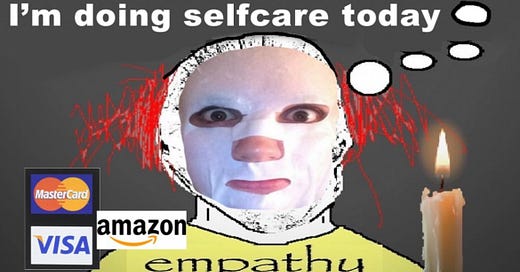




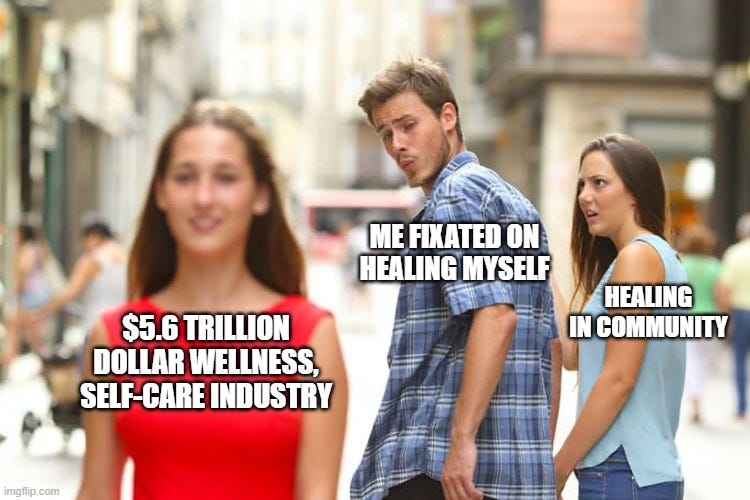
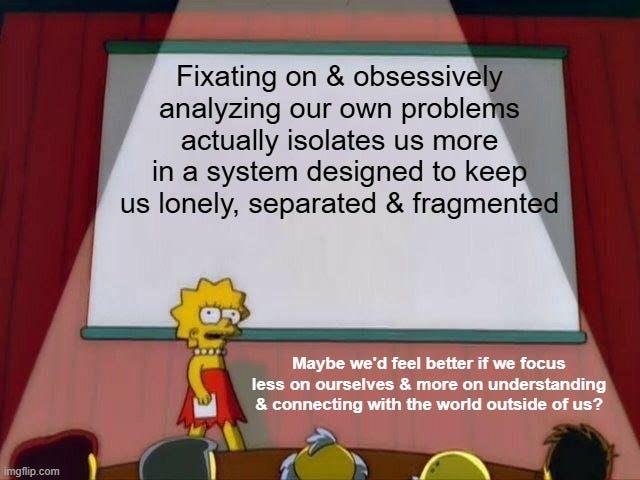
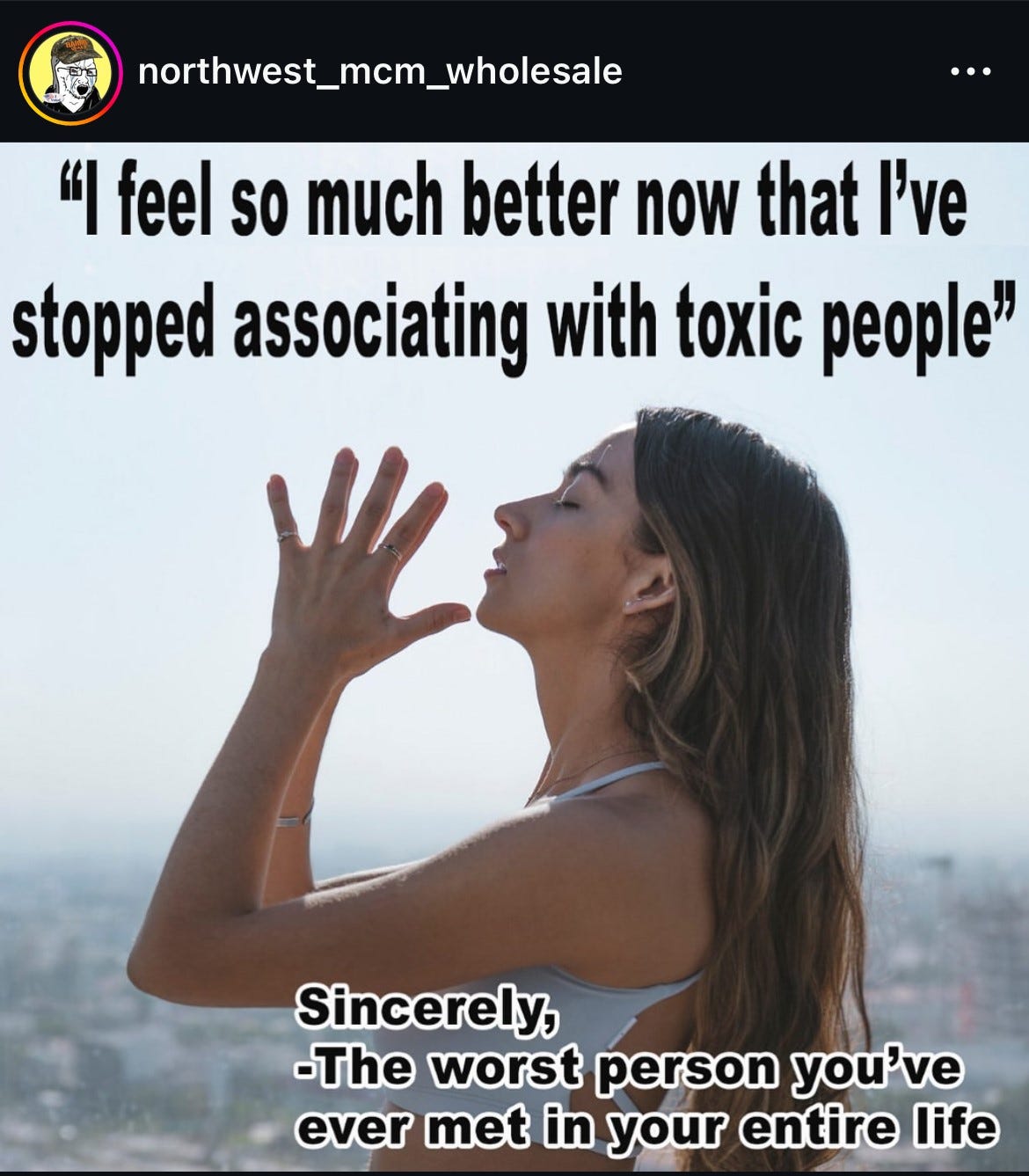
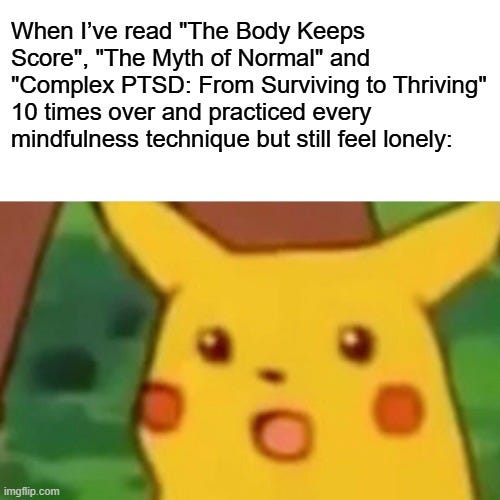
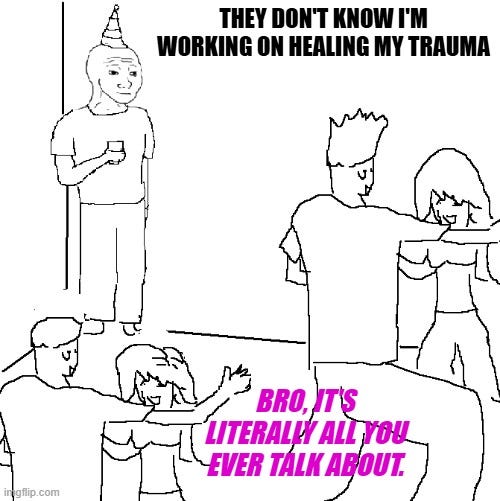
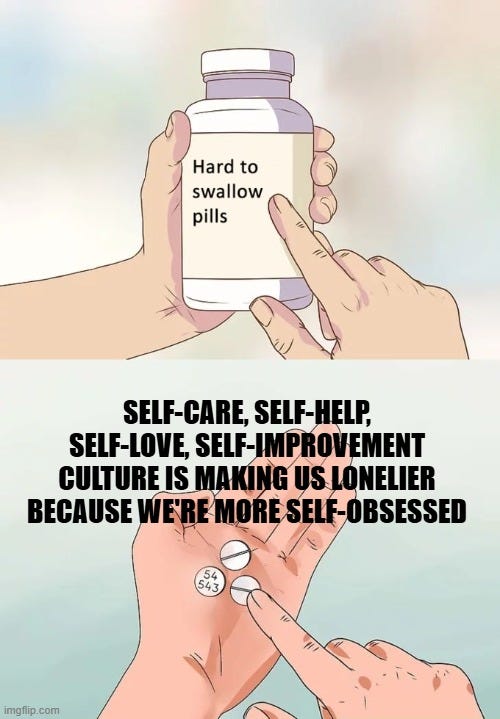
“Rarely, if ever, are any of us healed in isolation. Healing is an act of communion.” -bell hooks
I went to therapy school, spent years getting clinical hours to get licensed, spent too much money on trainings, read some of the books, all so I could sit in a room with another human being and their pain. Hot take, we don't need therapists, we don't need these fucking trainings, we don't need to intellectualize our hurt. We need safety to feel, community, connection, elders and ritual. White supremacy coopting healing is SOOOOOO WEIRD. And i'm an insider! It's fucking weird!!
Thanks for your thoughts. Ultimately, though, I think the missing piece is most of us have relational trauma from childhood (I would argue all trauma is relational) which means the relationship with other humans is fractured and we perpetuate these relational harm patterns into our adulthood. And yes, the root of the relational trauma is due to oppressive systems, but we have to heal somewhat to learn how to feel safe with ourselves (I.e. have a regulated nervous system) before we can relate to others.
Really recommend the neuroscientist and psychiatrist Dr Bruce Perry's work on the developing brain and how trauma impacts it. He talks about the 3 R's. 1st we need to regulate, 2nd we need to relate 3rd we need to reason (I.e. how our brains operate is that if due to trauma/stress the reptilian non verbal brain is in fight/flight/freeze survival mode, then our thinking cortex part of our brain is shut down, so we struggle to relate (via the limbic system) and to reason (via the cortex).
I find from my experience of being part of a family, workplace, activist group is we don't know how to be in right relationship with each other and relational harm is continually being enacted upon each other. I for sure never feel safe in these places, I only have a select number of people I feel safe with.